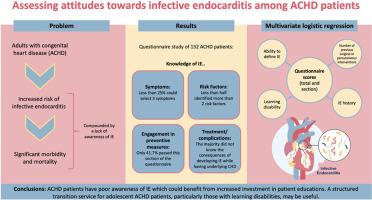Infective endocarditis: Awareness, knowledge gaps and behaviours amongst adults with congenital heart disease
IF 1.2
Q4 CARDIAC & CARDIOVASCULAR SYSTEMS
International journal of cardiology. Congenital heart disease
Pub Date : 2024-10-18
DOI:10.1016/j.ijcchd.2024.100548
引用次数: 0
Abstract
Background
Adults with congenital heart disease (ACHD) have an increased risk of infective endocarditis (IE), associated with significant morbidity and mortality. This risk is compounded by patient-related factors, including lack of awareness of IE and the presence of a learning disability (LD). Our study sought to evaluate patients' understanding of the risks and symptoms of IE and to identify patients who could benefit from targeted education.
Methods
Patients attending the outpatient department of a tertiary ACHD referral centre completed a questionnaire that assessed their knowledge, attitudes and behaviours towards IE. Baseline demographics and clinical data were collected from electronic patient records.
Results
A total of 132 ACHD patients completed the questionnaires (age 41.7 ± 16.4 years, 50 % male, 11 % with an LD). Only 37.1 % of patients accurately defined IE, none of whom had an LD. Most patients chose pyrexia (47 %) and tiredness (39.4 %) as potential symptoms of IE, however, none correctly identified all symptoms. Only 19.7 % were aware of the requirement for prolonged antibiotic treatment for IE. A third of all patients reported that they would have made lifestyle changes had they been aware of the complications of IE. There was a statistically significant association between learning disability and poor level of awareness in the questionnaire.
Conclusions
Our study demonstrates awareness issues regarding IE among ACHD patients, highlighting the need to invest further on patient education. This should start at the time of transition from paediatric to adult services and continue lifelong, with emphasis on patients with a learning disability.

感染性心内膜炎:患有先天性心脏病的成年人对感染性心内膜炎的认识、知识差距和行为习惯
背景患有先天性心脏病(ACHD)的成人罹患感染性心内膜炎(IE)的风险增加,发病率和死亡率都很高。患者相关因素(包括缺乏对 IE 的认识和存在学习障碍 (LD))加剧了这一风险。我们的研究旨在评估患者对 IE 风险和症状的了解程度,并确定哪些患者可以从有针对性的教育中受益。方法在一家三级 ACHD 转诊中心门诊部就诊的患者填写了一份调查问卷,以评估他们对 IE 的了解程度、态度和行为。结果共有132名ACHD患者填写了问卷(年龄为41.7 ± 16.4岁,50%为男性,11%患有LD)。只有 37.1% 的患者准确定义了 IE,其中没有一人患有 LD。大多数患者选择发热(47%)和疲倦(39.4%)作为 IE 的潜在症状,但没有一人能正确识别所有症状。只有 19.7% 的患者知道 IE 需要长期抗生素治疗。三分之一的患者表示,如果他们知道 IE 的并发症,就会改变生活方式。我们的研究表明,ACHD 患者对 IE 的认识存在问题,这凸显了进一步投资患者教育的必要性。这项工作应从儿科服务向成人服务过渡时开始,并持续终身,重点关注有学习障碍的患者。
本文章由计算机程序翻译,如有差异,请以英文原文为准。
求助全文
约1分钟内获得全文
求助全文
来源期刊

International journal of cardiology. Congenital heart disease
Cardiology and Cardiovascular Medicine
自引率
0.00%
发文量
0
审稿时长
83 days
 求助内容:
求助内容: 应助结果提醒方式:
应助结果提醒方式:


